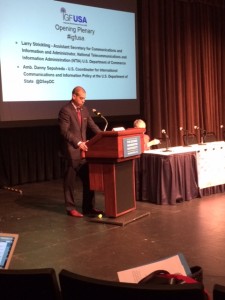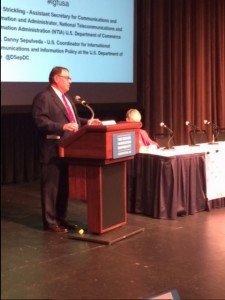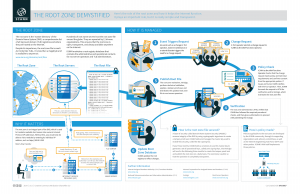An interns introduction to Internet Governance
On the 16th, I attended the Internet Governance Forum (IGF USA) hosted at George Washington University. Assistant Secretary Stickling of NTIA delivered a keynote address at the opening of the Forum and gave a shout out to the NTIA interns present. You can read his remarks here. Strickling, along with State Department representative Danny Sepulveda, spoke on the IANA Transition and ICANN, the nonprofit organization that currently manages the domain name registration system (DNS) under contract with NTIA. The DNS assigns domain names (like www.unc.edu ) and matches them up with numeric network addresses, which the public uses to navigate the internet. Any changes or updates are published in the Root Zone file, the master directory of the DNS. This graphic helps to explain the process and NTIA’s role.


In September, the U.S. government’s contract with ICANN will expire and, in good faith, NTIA has proposed not renewing the contract and to, instead, develop a multistakeholder process to manage a transition away from government involvement in this area of internet management. At a recent speech, Secretary Strickling reminded the audience that “this transition is the last step in a process that started 16 years ago when the U.S. government committed to allowing the private sector to take leadership for domain name system management.” Some oppose the transition and have spoken up with concerns about possible future government involvement and claims that the United States is “giving away the internet.”
The Department of Commerce, and the U.S. government as a whole, supports the vital role the open internet plays in economic growth, innovation, education, and freedom of speech. Many of NTIA’s initiatives tie in to this important concept. Administrators emphasize the importance of fighting against government control of content on the internet and opening up these processes to all stakeholders. With this in mind, Strickling promotes the multistakeholder process “as the best model for promoting a free and open Internet across the globe.”
Strickling and Sepulveda both spoke on the IANA transition, some of the mechanics behind it, implications for the internet on an international scale, and ways proposed plans to postpone the transition or limit funding may unnecessarily derail this process. Both of these speakers were also present at AEI’s event “Who gets to govern the internet? A conversation on securing the multistakeholder process. ” Check out Stickling’s remarks, here. If you’re interested in this issue, you can learn more about both sides of the argument by watching this debate on internet governance.




